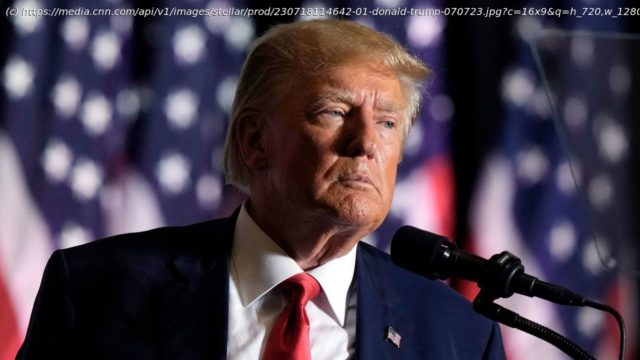Array
A version of this story appeared in CNN’s What Matters newsletter. To get it in your inbox, sign up for free here.
Former President Donald Trump said Tuesday he could soon be facing his third criminal indictment of the year. No president or former president has ever been charged with one crime, let alone three, so terms like “historic” and “unprecedented” no longer feel large enough to explain what is going on here.
What we know for sure is that Trump said he’s been informed he’s a target of the Justice Department’s investigation into the January 6, 2021, insurrection and efforts to overturn the 2020 presidential election and that the former president has been invited to appear before the federal grand jury in Washington, DC, that’s been hearing evidence related to that investigation.
Read the full report from CNN’s Jeremy Herb, Kristen Holmes, Kaitlan Collins, Paula Reid and Katelyn Polantz.
We should wait to see what, if anything, Smith ultimately alleges against Trump or his associates. But what Trump wanted to do to erase his election loss and how he planned to do it has been well documented in the years since.
Here’s an attempt to synthesize what CNN has been reporting in recent months along with what the House select committee that investigated January 6 laid out in its hearings and what Trump said publicly in 2020 and 2021. There are strong indications that whatever case Smith could bring would revolve around Trump’s public and behind-the-scenes effort to circumvent the Electoral College.
How is the Electoral College supposed to work?
Americans technically vote for electors when they vote for presidential candidates in early November. Electors are real people – often party activists – and the electors for the popular-vote winner in each state meet in their statehouses and cast electoral votes in mid-December (December 14 in 2020). Those Electoral College votes are then counted in Congress as the vice president presides on January 6. The new president is sworn in on January 20.
How did Trump try to get in the way?
He was up front with the broad strokes.
Here’s a tweet from the morning of January 6, hours before people he inspired stormed the US Capitol to stop the certification of Joe Biden’s Electoral College win:
“States want to correct their votes, which they now know were based on irregularities and fraud, plus corrupt process never received legislative approval. All Mike Pence has to do is send them back to the States, AND WE WIN. Do it Mike, this is a time for extreme courage!”
What does that mean?
Much of it is untrue. First, not a single state legislature passed any measures trying to “correct” their votes.” In fact, Republican state officials in Georgia and elsewhere rebuffed Trump’s efforts to subvert the election process.






